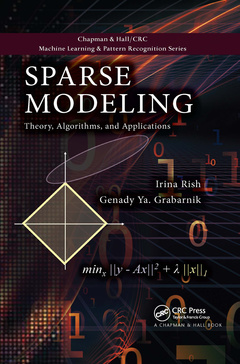Sparse Modeling Theory, Algorithms, and Applications Chapman & Hall/CRC Machine Learning & Pattern Recognition Series
Auteurs : Rish Irina, Grabarnik Genady

Sparse models are particularly useful in scientific applications, such as biomarker discovery in genetic or neuroimaging data, where the interpretability of a predictive model is essential. Sparsity can also dramatically improve the cost efficiency of signal processing.
Sparse Modeling: Theory, Algorithms, and Applications provides an introduction to the growing field of sparse modeling, including application examples, problem formulations that yield sparse solutions, algorithms for finding such solutions, and recent theoretical results on sparse recovery. The book gets you up to speed on the latest sparsity-related developments and will motivate you to continue learning about the field.
The authors first present motivating examples and a high-level survey of key recent developments in sparse modeling. The book then describes optimization problems involving commonly used sparsity-enforcing tools, presents essential theoretical results, and discusses several state-of-the-art algorithms for finding sparse solutions.
The authors go on to address a variety of sparse recovery problems that extend the basic formulation to more sophisticated forms of structured sparsity and to different loss functions. They also examine a particular class of sparse graphical models and cover dictionary learning and sparse matrix factorizations.
Introduction. Sparse Recovery: Problem Formulations. Theoretical Results (Deterministic Part). Theoretical Results (Probabilistic Part). Algorithms for Sparse Recovery Problems. Beyond LASSO: Structured Sparsity. Beyond LASSO: Other Loss Functions. Sparse Graphical Models. Sparse Matrix Factorization: Dictionary Learning and Beyond. Epilogue. Appendix. Bibliography. Index.
Date de parution : 09-2020
15.6x23.4 cm
Date de parution : 11-2014
Ouvrage de 250 p.
15.6x23.4 cm
Thèmes de Sparse Modeling :
Mots-clés :
Sparse Signal Recovery; Lasso Problem; Sparse Recovery; L1 Norm Minimization; Block Coordinate Descent; Laplace Priors; Group Lasso; Lasso Solution; Sparse Matrix Factorization; Simultaneous Variable Selection; Sparse Signal; Multi-task Learning; Sparse PCA; Compressed Sensing; En; Markov Network; Forward Stepwise Regression; Exponential Family Distribution; Sparse Coding; OMP; Lasso Approach; Johnson Lindenstrauss Lemma; Gaussian MRFs; Fused Lasso; Dictionary Learning



